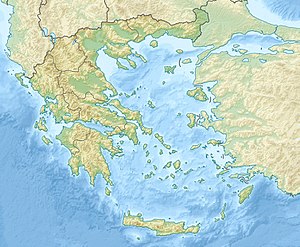Battle of Marathon
| Battle of Marathon | |||||||
|---|---|---|---|---|---|---|---|
| Part of the Greco-Persian Wars | |||||||
 The plain of Marathon today |
|||||||
|
|||||||
| Belligerents | |||||||
|
Athens, Plataea |
Persian Empire | ||||||
| Commanders and leaders | |||||||
|
Miltiades Callimachus † Aristides the Just Xanthippus (Pericles' father) Themistokles Stesilaos † Arimnestos |
Datis Artaphernes Hippias (deposed Athenian tyrant) |
||||||
| Strength | |||||||
| 9,000–10,000 Athenians, 1,000 Plataeans |
25,000 infantry and 1,000 cavalry (modern estimates) 100,000+ armed oarsmen and sailors (arranged as reserve troops they saw little action, mostly defending the ships) 600 triremes 50+ horse-carriers 200+ supply ships |
||||||
| Casualties and losses | |||||||
| 192 Athenians, 11 Plataeans (Herodotus) 1,000–3,000 dead (modern estimates) |
6,400 dead 7 ships destroyed (Herodotus) 4,000–5,000 dead (modern estimates) |
||||||
|
|
|||||||
The Battle of Marathon (Greek: Μάχη τοῦ Μαραθῶνος, Machē tou Marathōnos) took place in 490 BC, during the first Persian invasion of Greece. It was fought between the citizens of Athens, aided by Plataea, and a Persian force commanded by Datis and Artaphernes. The battle was the culmination of the first attempt by Persia, under King Darius I, to subjugate Greece. The Greek army decisively defeated the more numerous Persians, marking a turning point in the Greco-Persian Wars.
The first Persian invasion was a response to Greek involvement in the Ionian Revolt, when Athens and Eretria had sent a force to support the cities of Ionia in their attempt to overthrow Persian rule. The Athenians and Eretrians had succeeded in capturing and burning Sardis, but they were then forced to retreat with heavy losses. In response to this raid, Darius swore to burn down Athens and Eretria. According to Herodotus, Darius asked for his bow, he placed an arrow upon the string and he discharged it upwards towards heaven, and as he shot into the air he said: "Zeus, grant me to take vengeance upon the Athenians!". Also he charged one of his servants, to say "Master, remember the Athenians." three times before dinner each day.
At the time of the battle, Sparta and Athens were the two largest city states. Once the Ionian revolt was finally crushed by the Persian victory at the Battle of Lade in 494 BC, Darius began plans to subjugate Greece. In 490 BC, he sent a naval task force under Datis and Artaphernes across the Aegean, to subjugate the Cyclades, and then to make punitive attacks on Athens and Eretria. Reaching Euboea in mid-summer after a successful campaign in the Aegean, the Persians proceeded to besiege and capture Eretria. The Persian force then sailed for Attica, landing in the bay near the town of Marathon. The Athenians, joined by a small force from Plataea, marched to Marathon, and succeeded in blocking the two exits from the plain of Marathon. The Athenians also sent a message asking for support to the Spartans. When the messenger arrived in Sparta, the Spartans were involved in a religious festival and gave this as a reason for not coming to aid of the Athenians.
...
Wikipedia

